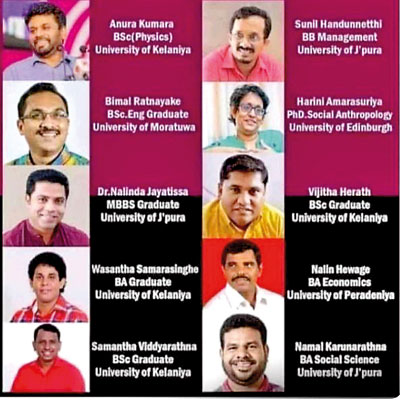Sunday Times 2
AKD and his team: English is not the be-all and end-all
View(s):By M.H.M. Faizer
We Sri Lankans have a prejudiced mind in many matters of interest. When I shared an image of the NPP team in one of my WhatsApp groups, most members did not comment, but one person rejected the team since he thought none of them could converse in English and that they were “pure” academics.
We Sri Lankans, especially the town folks, have a superiority complex when it comes to English. We feel we belong to a super club. This complex gains further weight because a vast majority of non-English-speaking people themselves suffer from an inferiority complex, except for those such as the guys in the NPP team picture. English is Queen’s language for our town guys and Kaduwa for the village lads.
Many of us may not be aware that there was a US president who opted not to take English as his first language!

Martin Van Buren, the 8th President of the US, did not speak English as his first language. He grew up speaking Dutch. He was fluent in English as well.
Most world leaders speak in their mother tongues at international forums such as the United Nations General Assembly and the Security Council. German people would like to listen to their leader speaking in German, and the Chinese will want President Xi Jinping to speak in Mandarin.
So what is this big noise about the newly elected President, Anura Kumara Dissanayake, not being fluent in English?
However, one must admit that English is the international language of business and diplomacy. As such, it would be better for a world leader to have a good level of comprehension of the English language.
Thailand’s military leader, General Prayut, cannot speak a word of English. He became the Prime Minister of Thailand from 2019 to 2023. But his wife was the head of the English department and an associate professor at the Faculty of Arts at Chulalongkorn University.
English is a language and a medium of expression. All languages are the same. Knowing good English does not confirm your intelligence. English is a global language. People who are eager to increase their knowledge can make use of the vast amount of literature available in English. But it does not mean it is a necessary condition for personality development. Three-fourths of the Europeans think in languages other than English. A sizable portion cannot speak English. Moreover, in countries such as Russia, China, and Japan, most people speak no English.
Being an undergraduate at Peradeniya University, we, the arts faculty English-medium students, were a minority as compared to more than a thousand Sinhala and Tamil medium students. However, I have had more than enough opportunities to share ideas with these students. I found them equally, if not more talented than us.
Whether you are in the English medium or not, what do universities teach you to become a graduate? They don’t “teach”; they only coach you—coach you to increase your IQ levels, intellectual and intelligence levels, and of course the technical competencies required to attain the outcome. Eg., economics for economic graduates, physics for physics graduates, etc. English is only a language used to communicate when imparting knowledge. Sinhala and Tamil are equally effective in the dissemination and transfer of knowledge.
A person fluent in English is not necessarily intelligent. In the US, beggars speak good English. But on the other hand, it is a reasonable expectation to presume that a university graduate will have a fair amount of reasoning skills and relationship skills; analytical and decision-making skills, etc. However, having a university degree is only a necessary condition but not a sufficient condition to achieve excellence. Many people are far more brilliant than university graduates. Together with their wisdom acquired with experience, they become a success story.
So when we say Anura Kumara Dissanayake has a team of graduates, it only infers that this team has the potential to become efficient and effective in whatever the effort they spend their time on.
Shoot for the moon. Even if you miss, you’ll land among the stars” is a famous quote first said by Norman Vincent Peale. It’s inspiring, uplifting, and helps the dreamer in all of us to keep on dreaming.
So Anura is shooting for the moon. He may not achieve it. But I am confident he will get the stars!
(The writer is a former Deputy Director General of the Board of Investment)

